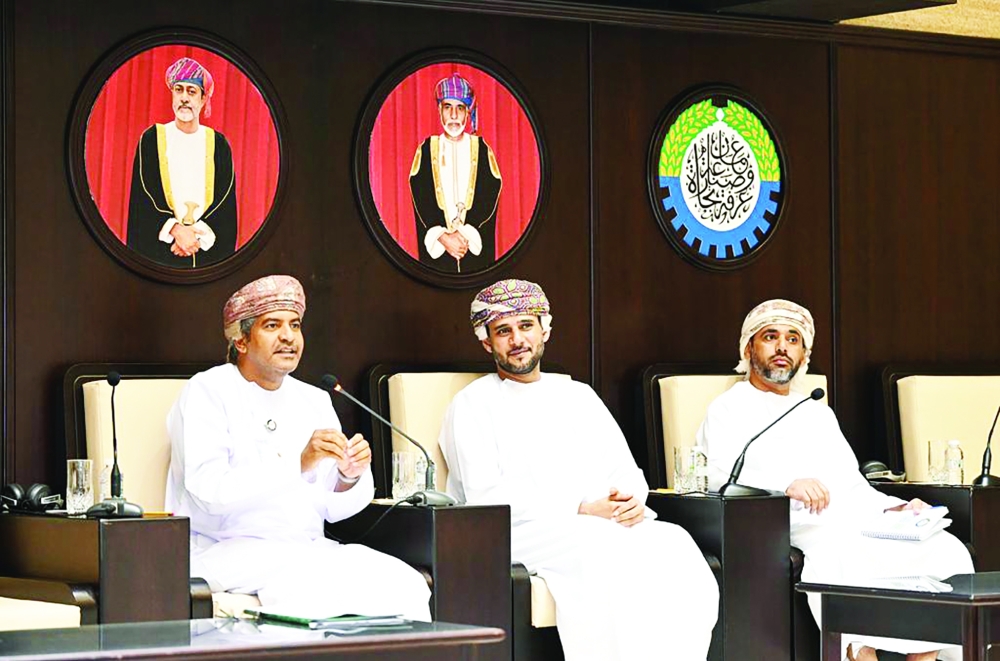30 transport regulations to be overhauled: MTCIT
Key platform: OCCI convenes high-level dialogue on Transport and Logistics Challenges
Published: 02:06 PM,Jun 05,2023 | EDITED : 06:06 PM,Jun 05,2023


The Oman Chamber of Commerce and Industry (OCCI) organized on Sunday a high-level dialogue session to address the pressing challenges faced by the transport and logistics sectors. Prominent attendees included Shaikh Faisal bin Abdullah al Rawas, Chairman of the OCCI, Eng Khamis bin Mohammed al Shamakhi, Transport Under-Secretary of the Ministry of Transport, Communications, and Information Technology (MTCIT), and Rashid bin Saeed al Ghaithi, Vice Chairman of the OCCI's Logistics Sector Committee.
During his opening speech, Shaikh Faisal al Rawas emphasized the pivotal role played by the transport and logistics sectors in propelling the Omani economy. He highlighted their significance in fostering economic growth, job creation, and trade promotion. Addressing the challenges faced by these sectors, such as high costs, inadequate infrastructure, and a shortage of skilled labor, was identified as a crucial priority.
Al Shamakhi, Transport Under-Secretary, took the opportunity to outline the ministry's plans for tackling the challenges confronting the transport and logistics sectors. The ministry aims to develop a comprehensive national logistics strategy, enhance the efficiency of the road network, and advocate for sustainable transportation modes.
Following the dialogue session, a question-and-answer segment provided participants with the opportunity to discuss various issues pertaining to the transport and logistics sectors. While acknowledging the significant challenges at hand, participants expressed optimism for the future.
Regulatory overhaul In a bid to establish a well-organized and sustainable transport and logistics system, the Ministry of Transport has unveiled an ambitious agenda for the current year. The primary objective of the ministry is to develop and update more than 30 legislation and regulations within the transport and logistics sector.
Key initiatives include the overhaul of the Roads Law, the implementation of a comprehensive policy and plan to ensure compliance with safety requirements in road projects, and the enforcement of rigorous quality control and monitoring protocols. The ministry also intends to launch a digital meter application for taxi vehicles to enhance efficiency and transparency in the transit system.
Furthermore, the ministry will formulate educational transport regulations, devise a comprehensive strategy for land ports and logistical centers, and issue international public transport regulations. In addition, there will be an in-depth analysis of human capital in the land transport sector and the updating of data pertaining to the land transport fleet in the Sultanate of Oman. The establishment of a user-friendly digital platform for electronic ticket issuance is also on the agenda.
In the maritime domain, the ministry will introduce a new maritime law and issue a set of regulations. Additionally, they will develop a design guide and standard specifications for marine facilities in the Sultanate of Oman. A strategic study to assess port conditions in the country and the implementation of a comprehensive multimodal transport law are also included in the ministry's plans.
To ensure the effectiveness of existing legislation, the ministry will review and evaluate laws pertaining to the logistics sector. They will also publish a reference framework delineating logistical professions, required skills, qualifications, and training opportunities. The ministry acknowledges the importance of revisiting local content policies and assignable contracts for logistics sector companies.
During his opening speech, Shaikh Faisal al Rawas emphasized the pivotal role played by the transport and logistics sectors in propelling the Omani economy. He highlighted their significance in fostering economic growth, job creation, and trade promotion. Addressing the challenges faced by these sectors, such as high costs, inadequate infrastructure, and a shortage of skilled labor, was identified as a crucial priority.
Al Shamakhi, Transport Under-Secretary, took the opportunity to outline the ministry's plans for tackling the challenges confronting the transport and logistics sectors. The ministry aims to develop a comprehensive national logistics strategy, enhance the efficiency of the road network, and advocate for sustainable transportation modes.
Following the dialogue session, a question-and-answer segment provided participants with the opportunity to discuss various issues pertaining to the transport and logistics sectors. While acknowledging the significant challenges at hand, participants expressed optimism for the future.
Regulatory overhaul In a bid to establish a well-organized and sustainable transport and logistics system, the Ministry of Transport has unveiled an ambitious agenda for the current year. The primary objective of the ministry is to develop and update more than 30 legislation and regulations within the transport and logistics sector.
Key initiatives include the overhaul of the Roads Law, the implementation of a comprehensive policy and plan to ensure compliance with safety requirements in road projects, and the enforcement of rigorous quality control and monitoring protocols. The ministry also intends to launch a digital meter application for taxi vehicles to enhance efficiency and transparency in the transit system.
Furthermore, the ministry will formulate educational transport regulations, devise a comprehensive strategy for land ports and logistical centers, and issue international public transport regulations. In addition, there will be an in-depth analysis of human capital in the land transport sector and the updating of data pertaining to the land transport fleet in the Sultanate of Oman. The establishment of a user-friendly digital platform for electronic ticket issuance is also on the agenda.
In the maritime domain, the ministry will introduce a new maritime law and issue a set of regulations. Additionally, they will develop a design guide and standard specifications for marine facilities in the Sultanate of Oman. A strategic study to assess port conditions in the country and the implementation of a comprehensive multimodal transport law are also included in the ministry's plans.
To ensure the effectiveness of existing legislation, the ministry will review and evaluate laws pertaining to the logistics sector. They will also publish a reference framework delineating logistical professions, required skills, qualifications, and training opportunities. The ministry acknowledges the importance of revisiting local content policies and assignable contracts for logistics sector companies.
